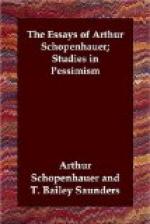A man’s knowledge may be said to be mature, in other words, it has reached the most complete state of perfection to which he, as an individual, is capable of bringing it, when an exact correspondence is established between the whole of his abstract ideas and the things he has actually perceived for himself. This will mean that each of his abstract ideas rests, directly or indirectly, upon a basis of observation, which alone endows it with any real value; and also that he is able to place every observation he makes under the right abstract idea which belongs to it. Maturity is the work of experience alone; and therefore it requires time. The knowledge we derive from our own observation is usually distinct from that which we acquire through the medium of abstract ideas; the one coming to us in the natural way, the other by what people tell us, and the course of instruction we receive, whether it is good or bad. The result is, that in youth there is generally very little agreement or correspondence between our abstract ideas, which are merely phrases in the mind, and that real knowledge which we have obtained by our own observation. It is only later on that a gradual approach takes place between these two kinds of knowledge, accompanied by a mutual correction of error; and knowledge is not mature until this coalition is accomplished. This maturity or perfection of knowledge is something quite independent of another kind of perfection, which may be of a high or a low order—the perfection, I mean, to which a man may bring his own individual faculties; which is measured, not by any correspondence between the two kinds of knowledge, but by the degree of intensity which each kind attains.
For the practical man the most needful thing is to acquire an accurate and profound knowledge of the ways of the world. But this, though the most needful, is also the most wearisome of all studies, as a man may reach a great age without coming to the end of his task; whereas, in the domain of the sciences, he masters the more important facts when he is still young. In acquiring that knowledge of the world, it is while he is a novice, namely, in boyhood and in youth, that the first and hardest lessons are put before him; but it often happens that even in later years there is still a great deal to be learned.
The study is difficult enough in itself; but the difficulty is doubled by novels, which represent a state of things in life and the world, such as, in fact, does not exist. Youth is credulous, and accepts these views of life, which then become part and parcel of the mind; so that, instead of a merely negative condition of ignorance, you have positive error—a whole tissue of false notions to start with; and at a later date these actually spoil the schooling of experience, and put a wrong construction on the lessons it teaches. If, before this, the youth had no light at all to guide him, he is now misled by a will-o’-the-wisp;




